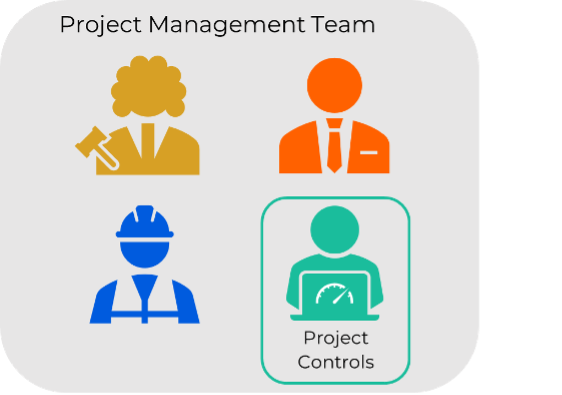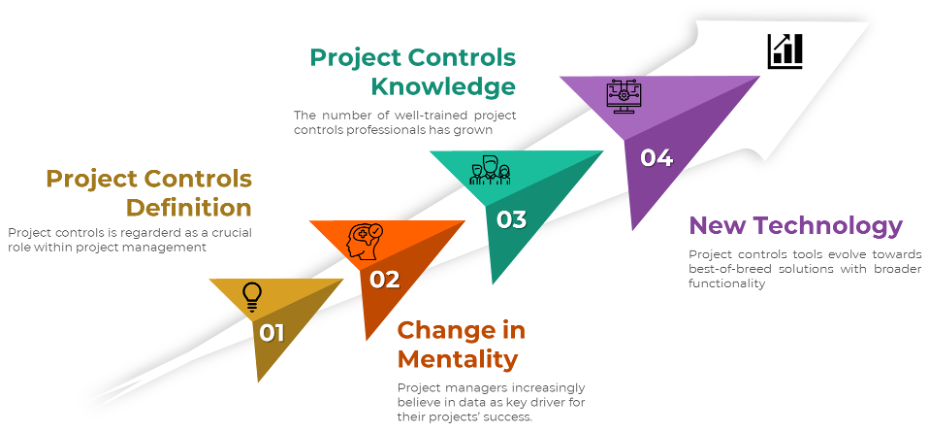
Project Controls - Recap, overview and outlook


In April 2017, we published a definition of project controls as our very first blog post on this site. The blog post stated that the era of the big shot “I can do it all” project manager might be over and that project management would increasingly become a team effort.

The blog post mentioned that the analytical part of project management, or project controls, deserved to be considered a profession on its own. Project controls was, at that time, not an established concept in our Western European market. We did have some Primavera P6 planning engineers, but they were very much “doing their thing” in a corner to comply with contractual requirements.
Project controls today
Six years later, project controls clearly had its breakthrough, and any complex technical project nowadays applies project controls techniques. Many of our clients invested heavily to deploy project controls.

Change in mentality
We see a generation of project managers that believe in data as key driver for their projects’ success. They no longer regard project scheduling as merely a contractual requirement, but as a basis for making solid decisions. Project controls needs these believers more than anything.
Project controls knowledge
We have witnessed project controls departments grow from one person to tens of well-trained professionals. There is now a general understanding that it is not sufficient to learn a project scheduling tool such as Primavera P6. The essentials behind these tools also matter. We still observe a lack of project management education at our universities, but as a training provider, we can somehow live with that.
New technology
Lastly, the number of project controls tools that have penetrated the market since 2017 is staggering. The time that we only used MS Project and Primavera P6 is far gone. These new tools show a clear evolution from point solutions to best-of-breed solution with much broader functionality. Scheduling, cost control, BIM, and document management are interrelated, and tools are increasingly connecting them.
Project controls now is the profession we hoped it would become in 2017. We feel that we have reached a certain ‘essential’ maturity level.
Project controls current challenges
As project controls advocates our journey is of course not over. We see ample further growth potential for project controls, especially if we look at the challenges that we currently face in some projects:
- Project controls is still somewhat an expertise. Bottom line, the aim is not to have experts in project data analysis but to have collaborative data-driven project organizations. Everyone in the project team should be data-driven in their decision making and the previously described site disconnect should be resolved. Data experts would then rather become facilitators of data analysis than its executers.
- Even while tools evolved enormously in the past ten years (and whatever salespeople may declare), with today’s tools we still struggle to implement integrated project controls to the fullest. Our view on integrated project controls goes further than the integration that current software platforms are offering. Full integration still has a roadmap.
- In project controls we are good at analyzing and reporting current project performance and in taking actions whenever this performance is poor. This approach is rather problem-oriented and descriptive. Historical data of previous projects is largely ignored. With the current state of data science, a more prescriptive approach should be envisioned.
- The last challenge remains about the data-driven mentality. While most managers would agree in a meeting that collaboration and transparency are good for their project, it is a real-life pitfall to fall back on a much more protective and defensive approach when facing complex contract situations. For data-driven project management, the willingness to use and share reliable data is a hard requirement.
The way forward
At Proove we are more convinced than ever of the virtues of project controls and we will continue to be advocates and innovators in this field.
We will keep focusing on the Essentials of Project Controls, but we will simultaneously also invest to tackle the above-mentioned challenges. You can expect from us blog posts, seminars and more around collaborative planning, project controls integration and data science.
And in a number of years, we will be back to see where we stand.
Related content


